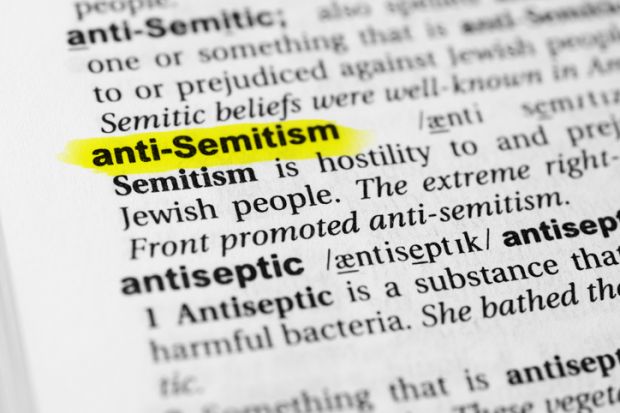As the debate on the International Holocaust Remembrance Alliance’s (IHRA) Working Definition of Antisemitism moves on to university campuses, it becomes all too clear that some voices have been systematically shut out. Besides Palestinians and many Jewish voices in the UK and elsewhere, critical Israeli voices have been silenced or ignored.
I am a British academic and an Israeli national of Jewish descent. My adult life, both in Israel and elsewhere, has been marked by a consistent struggle against injustice, including opposition to Israel’s occupation, dispossession and segregation of Palestinians. As such, I have been greatly perturbed by UK education secretary Gavin Williamson’s attempt to impose the IHRA working definition on UK universities.
Fighting antisemitism is a must, but the IHRA document undermines that fight, threatening free speech and academic freedom, while constituting an attack on the Palestinian right to self-determination and on the struggle to democratise Israel.
In the unfolding debate, my voice as an academic and an Israeli dissident deserves to be heard. I do not stand alone; more than 60 Israelis in UK academia have recently written an open letter to our vice-chancellors and academic senates, urging them to reject the IHRA working definition.
The document has been extensively criticised for its vagueness and for failing to mention central issues, such as prejudice and discrimination. It is weaker than existing anti-racist regulations in the UK university sector – which, importantly, are also inclusive of other ethnic minorities. It is disturbing, frankly, that Williamson singles out people of Jewish descent as deserving greater protection than others who are nowadays regularly subjected to equally or more egregious manifestations of racism and discrimination.
Even more problematically, the IHRA document includes illustrations that conflate criticism of Israel with antisemitism. Its examples of manifestations of antisemitism include claiming that “that the existence of a State of Israel is a racist endeavour” or “requiring of [Israel]…a behaviour not expected or demanded of any other democratic nation”. Thus, the document renders it illegitimate, even in a university setting, to debate whether Israel, as a self-proclaimed Jewish state, is “‘a racist endeavour” or a “democratic nation”.
At yet of the 14 million people under Israel’s control, 5 million are devoid of basic human rights. An additional 1.8 million are legally and procedurally barred from equal access to property, national resources and land, and they do not enjoy equal cultural rights. All 6.8 million thus prevented from full democratic access are non-Jews.
An emblematic illustration is the Law of Return, which entitles all Jews and only Jews to migrate to Israel and acquire Israeli citizenship, a right extendable to descendants and spouses. But millions of displaced or exiled Palestinians and their descendants are denied the right to return to their homeland.
Such discriminatory legislation and state practices, past and present, from China to Australia to the US, are regularly scrutinised by academics and are frequently considered forms of institutional racism. When it comes to the State of Israel, however, Williamson wants to forbid this form of scrutiny.
With its 11 “illustrations”, the IHRA document has already been used to repress freedom of speech and academic freedom. Alarmingly, it has served to frame the struggle against the occupation and dispossession of Palestinians as antisemitic. Yet, as 122 Palestinian and Arab intellectuals recently stated in an open letter to The Guardian, “the demand by Palestinians for their right of return to the land from which they…were expelled…is a right recognised by international law…To level a charge of antisemitism against anyone who regards the existing state of Israel as racist, notwithstanding the actual institutional and constitutional discrimination upon which it is based, amounts to granting Israel absolute impunity.”
For these and other reasons, even the IHRA working definition’s lead drafter, Kenneth Stern, publicly warned in 2019 that right-wing Jewish groups “decided to weaponise” the document, which “was never intended to be a campus hate speech code”.
My concerns are shared by hundreds of UK students, the British Society of Middle Eastern Studies and scholars of antisemitism and racism, as well as numerous Palestinian, Jewish and social justice groups on both sides of the Atlantic.
Along with my fellow Israeli dissidents in British academe, I call on UK universities to reject the IHRA document – or, where it has already been adopted, to revoke it. It contradicts universities’ commitment to free speech and academic freedom, and it undermines the ongoing fight against racism, including antisemitism, in all its ugly forms.
Hagit Borer is professor of linguistics and head of department at Queen Mary University of London.
Register to continue
Why register?
- Registration is free and only takes a moment
- Once registered, you can read 3 articles a month
- Sign up for our newsletter
Subscribe
Or subscribe for unlimited access to:
- Unlimited access to news, views, insights & reviews
- Digital editions
- Digital access to THE’s university and college rankings analysis
Already registered or a current subscriber? Login








